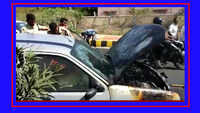‘Let’s start building a medical record of every schoolchild’
TNN | Apr 19, 2019, 04:52 IST
Gurgaon: Very few people really care about the fact that you’re trying to solve a social problem.” That’s Priya Prakash, founder and CEO of HealthSetGo, on her life’s endeavour. She certainly cares, for this healthcare platform has reached out to 1.2 million students in more than 250 schools in 77 cities, across India. Her efforts have succeeded in sensitising teachers, principals and educators to the importance of empowering schoolkids with an awareness of physical and mental wellbeing, and healthy habits. Now, Prakash’s social-impact business (founded August 2016) has earned her nomination as a finalist — from the South Asia and Oceania region — in the prestigious Cartier Women’s Initiative Awards (2019).
Changes for the better
In 2015, the United Nations declared the Sustainable Development Goals (SDGs). Goal no. 3, good health and wellbeing, was the one that said ‘prevention’ — for the first time. Global priorities are shifting. People like Mark Zuckerberg and Priscilla Chan have just pledged $3 billion to the big question of, ‘Can we cure or prevent all diseases in this world?’ That is where the focus is now. And because of that, CBSE recently declared that students of class-IX to class-XII won’t be allowed to register for their board exams if they do not submit their medical check-up forms. And that was a huge deal. As an ecosystem, parents are becoming aware, children are becoming aware. So, it’s all coming together.
Clean bill of health
One of the biggest things we said when we went to schools was that we need to have a baseline — what is this school’s health? Let’s start building a medical record of every child, capture this information and digitise it, so that as a parent you have lifelong access to this info. From the age of two to 17 is 15 years — if we capture 15 years in the medical timeline of any individual, there is a huge benefit you can get as a human being to take health decisions. Today, in all schools that HealthSetGo touches, we do a physical check, an ENT check, an eye check, a growth check, a dental check, and all these medical reports are compiled and sent online to parents, who can see their child’s medical history from day one.
Lessons in living well
Last September, we launched a 21-day ‘eat right’ challenge, in which more than 100 schools participated. And kids started to build that healthy habit — because, you need to know about the food on your table, and how to read labels, etc. Also, we divide the year into a few months — so, for example, we have a sugar awareness month, a hygiene and sanitation month. Every school we work with gets a lot of health materials from us each quarter, and using these materials they’re able to promote health education in their schools in a very easy way. It’s not preachy, we don’t believe in doctors coming in and giving lectures. That’s how we look at health education.
The role of the govt
We have recently started working with Visakhapatnam smart city, with all 122 schools of the region. So, we went to these schools, with about 10,000-plus children, we screened all of them, and showed the data to the government in a way that it can take action. Out of the 10,000, if 30% have eye problems, it’s very clear they need 3,000 spectacles — can the government fund 3,000 spectacles? Yes, they can, they have the budget. If this percentage of girls is anaemic, can we get iron tablets to them? Yes, we can. Suddenly, these issues are getting detected, and we are ensuring that government money goes where it is supposed to.
Changes for the better
In 2015, the United Nations declared the Sustainable Development Goals (SDGs). Goal no. 3, good health and wellbeing, was the one that said ‘prevention’ — for the first time. Global priorities are shifting. People like Mark Zuckerberg and Priscilla Chan have just pledged $3 billion to the big question of, ‘Can we cure or prevent all diseases in this world?’ That is where the focus is now. And because of that, CBSE recently declared that students of class-IX to class-XII won’t be allowed to register for their board exams if they do not submit their medical check-up forms. And that was a huge deal. As an ecosystem, parents are becoming aware, children are becoming aware. So, it’s all coming together.
Clean bill of health
One of the biggest things we said when we went to schools was that we need to have a baseline — what is this school’s health? Let’s start building a medical record of every child, capture this information and digitise it, so that as a parent you have lifelong access to this info. From the age of two to 17 is 15 years — if we capture 15 years in the medical timeline of any individual, there is a huge benefit you can get as a human being to take health decisions. Today, in all schools that HealthSetGo touches, we do a physical check, an ENT check, an eye check, a growth check, a dental check, and all these medical reports are compiled and sent online to parents, who can see their child’s medical history from day one.
Lessons in living well
Last September, we launched a 21-day ‘eat right’ challenge, in which more than 100 schools participated. And kids started to build that healthy habit — because, you need to know about the food on your table, and how to read labels, etc. Also, we divide the year into a few months — so, for example, we have a sugar awareness month, a hygiene and sanitation month. Every school we work with gets a lot of health materials from us each quarter, and using these materials they’re able to promote health education in their schools in a very easy way. It’s not preachy, we don’t believe in doctors coming in and giving lectures. That’s how we look at health education.
The role of the govt
We have recently started working with Visakhapatnam smart city, with all 122 schools of the region. So, we went to these schools, with about 10,000-plus children, we screened all of them, and showed the data to the government in a way that it can take action. Out of the 10,000, if 30% have eye problems, it’s very clear they need 3,000 spectacles — can the government fund 3,000 spectacles? Yes, they can, they have the budget. If this percentage of girls is anaemic, can we get iron tablets to them? Yes, we can. Suddenly, these issues are getting detected, and we are ensuring that government money goes where it is supposed to.
Making sense of 2019
#Electionswithtimes
View Full Coverage

































All Comments ()+^ Back to Top
Refrain from posting comments that are obscene, defamatory or inflammatory, and do not indulge in personal attacks, name calling or inciting hatred against any community. Help us delete comments that do not follow these guidelines by marking them offensive. Let's work together to keep the conversation civil.
HIDE